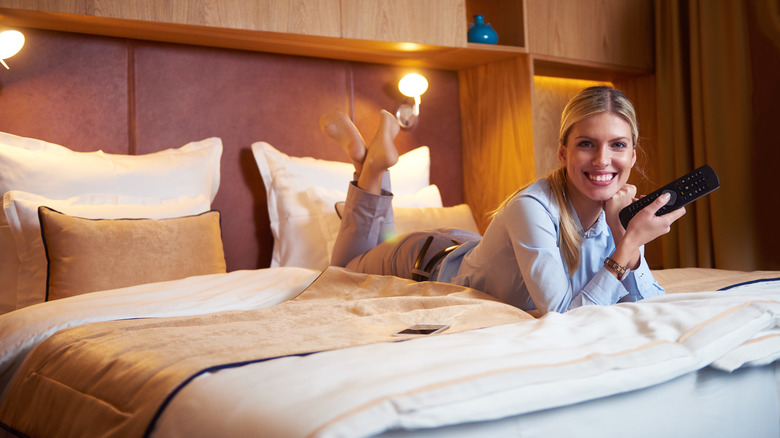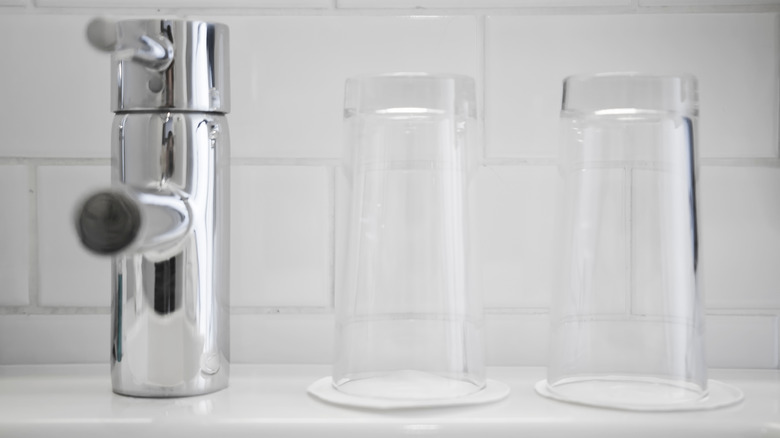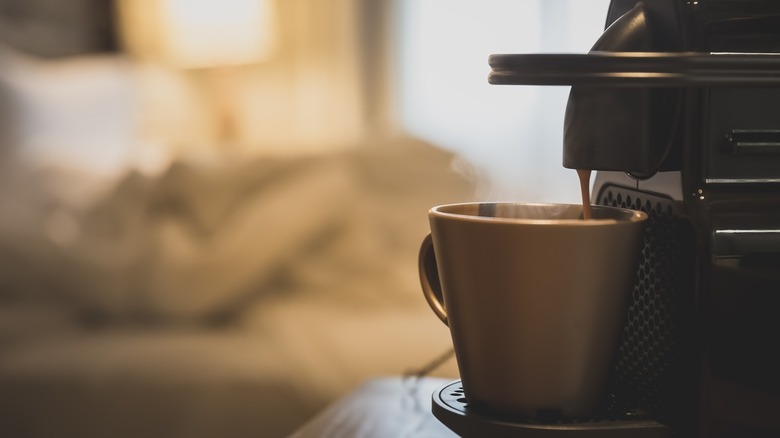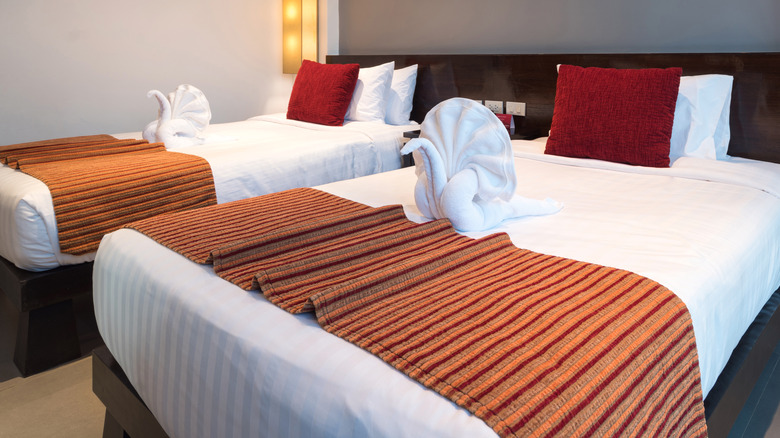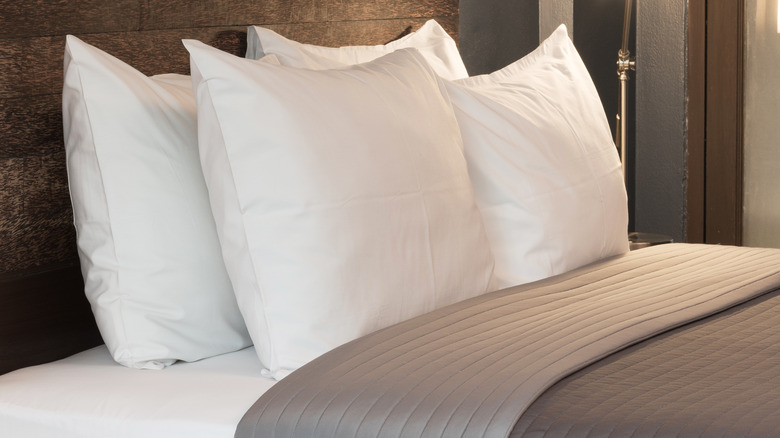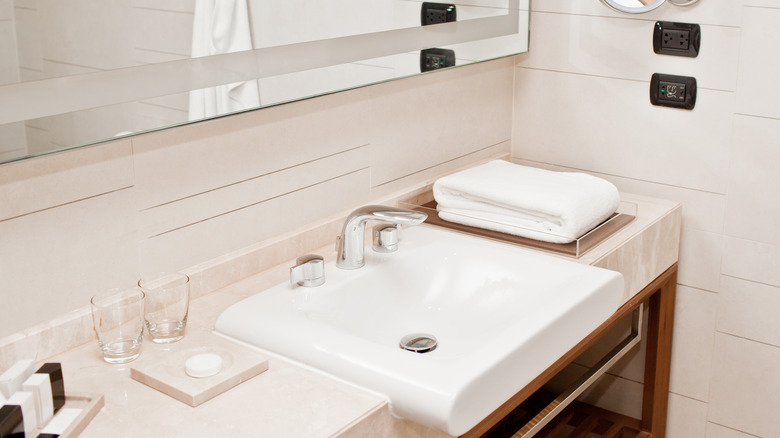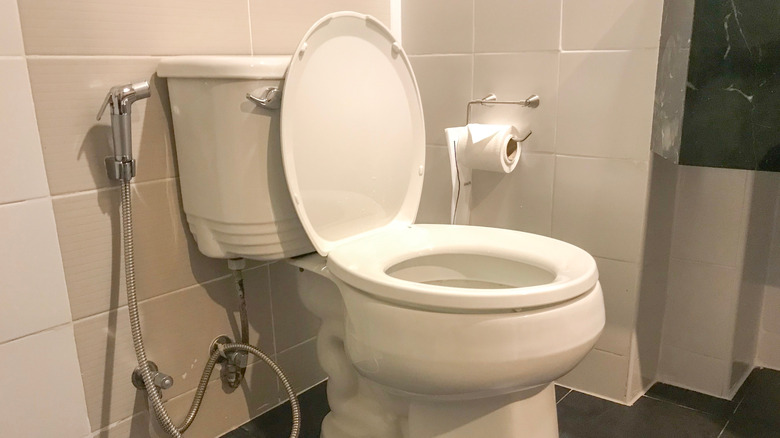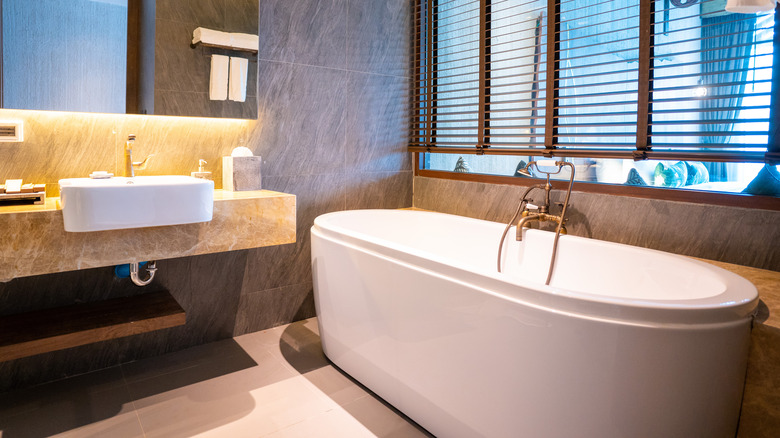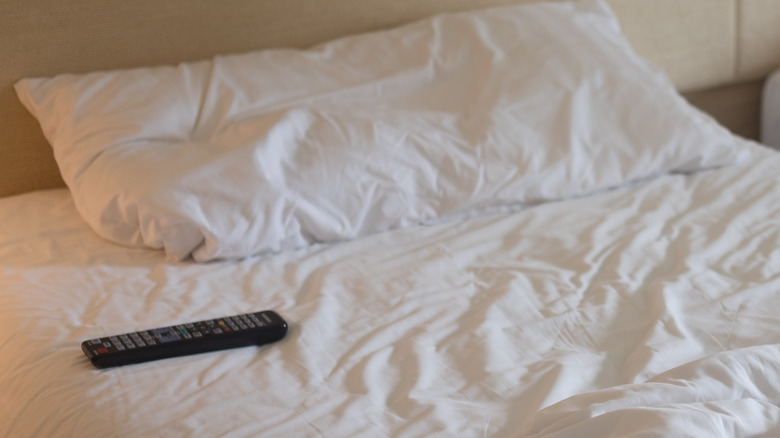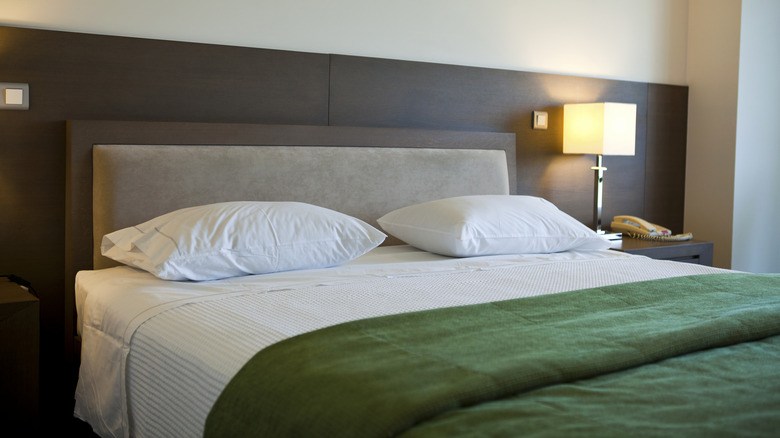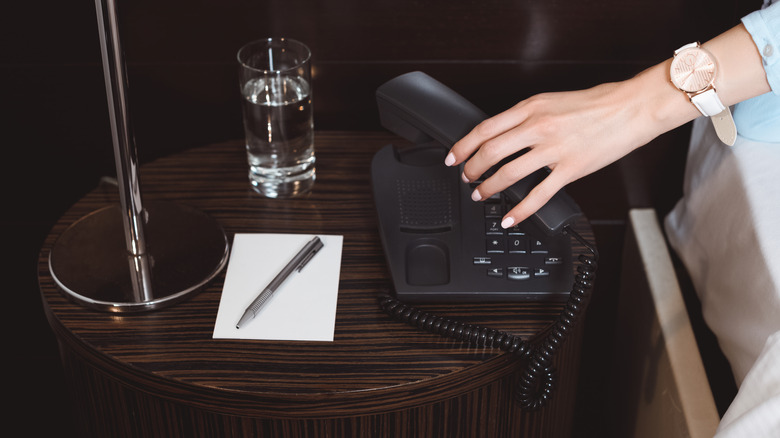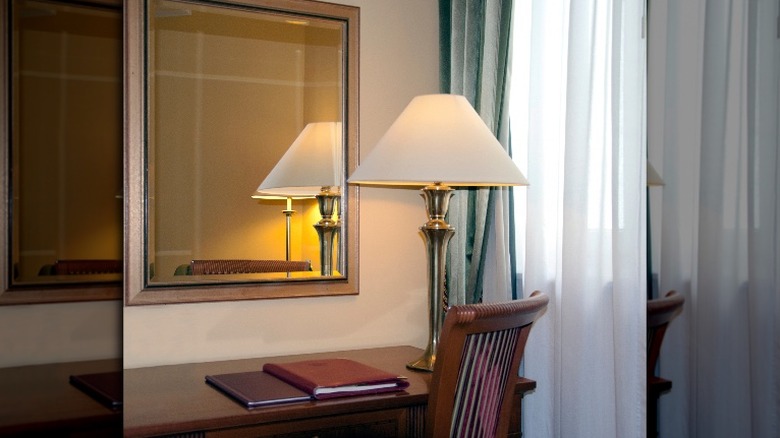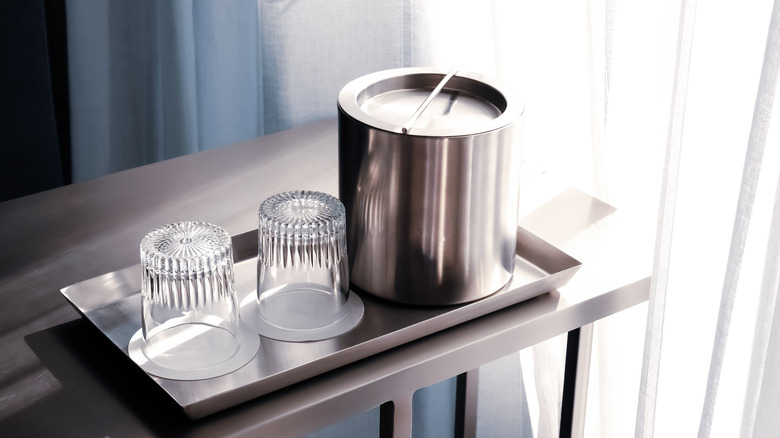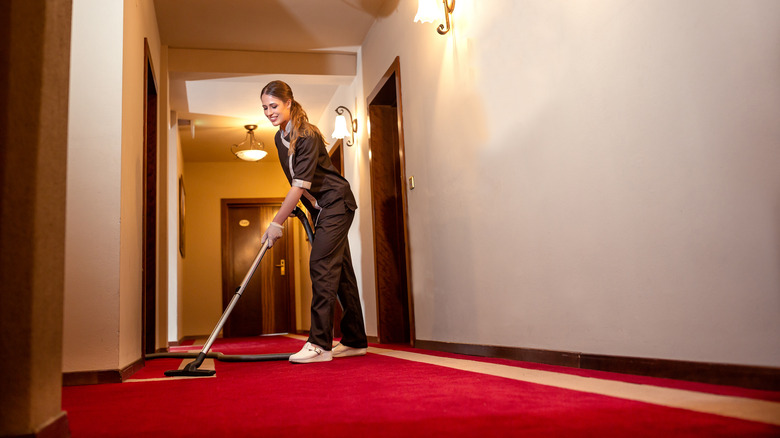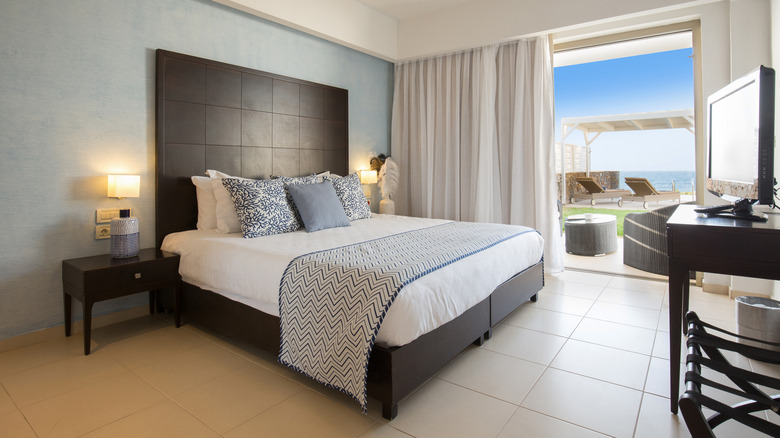Things In A Hotel Room You Should Absolutely Avoid Touching
Spending a night in a hotel room can be relaxing. "Staying at a hotel should be an escape," Dena Braun, jet-setter and managing director of Fitglobetrotter Wellness Consulting, told USA Today, "not a nightmare." That's why she says she creates "a sanctuary" while she's away. She requests a room far removed from the noisy elevator or busy street. She also makes sure to travel with her white-noise machine and ear plugs — just in case.
Frequent traveler and author of TurboCharged, Dian Griesel prefers to bring a scented candle with her when she's traveling. "Having a room smell like home makes it feel fresher, homier and can help make sleep easier," she told the publication.
But, even if you strive to make a homey oasis within a hotel, your room likely still contains the stuff of nightmares, e.g. germs. Lots and lots of germs. This is a problem that can't be solved with Bath & Body Works scented candles or earplugs. What can you do? According to health inspectors, microbiologists, and various other experts, you're going to want to absolutely avoid touching certain items in a hotel room. After all, there are quite a few secrets hotels don't want you to know.
Whether you're staying in a five-star luxury resort or a budget motel, you should keep your hands off the following things.
You should absolutely avoid touching the drinking glasses next to your hotel room sink
Hotels may provide you with drinking glasses, but you'd be better off drinking from the faucet. An undercover investigation conducted by ABC15, a subsidiary of ABC News, revealed that those hotel room drinking glasses are so dirty they pose a potential health hazard. According to the state of Arizona's health code, hotel drinking glasses must be properly cleaned and sanitized. But, of the four hotels examined in the investigation, three failed for nauseating reasons ranging from using a towel or sponge to wipe them "clean" or not even replacing them with fresh ones for the next guest.
Other ABC News stations conducted their own investigations and found similar results across the United States. One housekeeper at a hotel in Cincinnati, Ohio was seen spraying dirty drinking glasses with what appeared to be Lysol mildew remover. At another hotel in Cincinnati, investigators witnessed a housekeeper drying drinking glasses with a dirty hand towel. Housekeepers at a hotel in Phoenix, Ariz. were also observed rinsing and drying dirty drinking glasses with a rag. In total, 11 of 15 hotels across the country failed to properly clean and sanitize their drinking glasses.
You'll want to avoid touching your hotel room's coffee machine
Small coffee machines have become the norm in hotel rooms, but you may want to think twice before brewing some morning java at your hotel. For one, coffee makers need to be thoroughly cleaned and descaled. Otherwise, mold and bacteria will take over. According to Express, researchers at the University of Valencia in Spain examined nine Nespresso machines that had been in use for over a year. All of the machines were found to contain a "moderately to highly abundant" amount of bacteria.
Additionally, coffee makers confined to hotel rooms can be even worse, Charles Gerba, professor of microbiology and environmental sciences at the University of Arizona, explained to The Sun (via Express). This is because housekeepers can transfer germs from one room to the next during cleaning.
And how these coffee machines are "cleaned" is even more horrifying. ABC News investigators witnessed a housekeeper at hotel in Cincinnati, Ohio using her foot to wipe a clean towel across a dirty floor. She then took that same towel and wiped down the coffee pot. Cincinnati Health Department's Dale Grigsby likened this method to "playing with a loaded gun."
You might not want to touch hotel room bedspreads
In a study presented to the American Society for Microbiology in 2012, researchers revealed that around 81 percent of the hotel room surfaces they analyzed contained at least some fecal bacteria, as noted by Scientific American. Ick. While you may think of hard surfaces as the ones to harbor bacteria, soft surfaces were even proven to contain the harmful bacteria.
Kelly Reynolds, germ expert and associate professor of environmental health at the University of Arizona, told Time that hotel guests should be wary of the bedspread. Although housekeepers are instructed to change the sheets and towels prior to a new guest's arrival, those bedspreads aren't necessarily laundered after each stay. Of course, this can vary by hotel, so it's a good idea to call ahead and ask about cleaning practices prior to arriving.
Otherwise, you'll want to steer clear of the bedspread. "Your best bet is to avoid contact," Reynolds explained. "A lot of people will recommend just folding the bedspread back or throwing it on the chair and don't use it while you're there."
You should absolutely avoid touching hotel room pillowcases
Turns out that pillowcases can be pretty gross in hotel rooms. An undercover investigation conducted in 2014 and reported by Today found that many popular hotel chains didn't change all the bed linens, even when requested by the guests.
One housekeeper was witnessed setting the bed pillows aside as she changed the sheets, then putting the same pillows — pillowcases unchanged — back on the bed. A housekeeper at a different hotel was also observed putting used pillows back on a guest's bed after she set them down on a chair.
Jacob Tomsky, a hotel expert and author of Heads in Beds: A Reckless Memoir of Hotels, Hustles, and So-Called Hospitality, commented on the investigation, telling Today, "Housekeepers should change the pillowcases, obviously. That's where you put your face. That's what you sleep on." He continued, saying, "What really bothered me was that she put the pillowcase on a dirty chair prior to putting it back on the bed. That just gets it even more dirty." You may want to consider bringing your own pillowcases on your next trip.
Don't touch hotel room bathroom counters
A study conducted by TravelMath revealed that the average hotel room is "dirtier than a typical home, an airplane, and even a school." As part of the study, rooms in three-, four-, and five-star hotels were analyzed. It was revealed that, on average, the bathroom counter is the most contaminated surface in the rooms. The bathroom counters in 5-star hotels are the only exception, coming in second place to the TV remote.
In addition to the counters, the sink, too, is likely to be contaminated. A study by the University of Houston (via Reuters) found hotel sinks to contain fecal bacteria. So, what are you to do?
TravelMath advises guests to "wash your hands frequently, disinfect surfaces before touching them, and steer clear of certain areas." Although you will want to avoid touching the bathroom counter when you first arrive at your hotel room, it's kind of impossible to "steer clear" of the bathroom for the duration fo your trip. As such, the site further advised packing "a small bottle of disinfectant spray and a carton of alcohol wipes to disinfect frequently touched surfaces," including the bacteria-harboring bathroom counter and sink. Oh, and you may just want to avoid using hotel hair dryers, too.
You should absolutely avoid touching hotel room toilet areas
Hotel room toilet seats are heavily contaminated with bacteria, including fecal bacteria. Avoiding using your hotel room toilet is likely not possible, but you should avoid touching the seat until after you do some disinfecting. "With a tissue, lift the toilet seat and spray both sides of the seat with Lysol, even if it looks spotless," Philip M. Tierno, a microbiologist and professor of microbiology at the New York University School of Medicine, revealed to Real Simple.
Unfortunately, it's likely not just the seat that's filled with bacteria. "When you flush the toilet, the viruses and the feces do get spread throughout the walls of the toilet, the flush handle, and the walls of the bathroom," Kelly Reynolds, germ expert and associate professor of environmental health at the University of Arizona, told Time. Any of the areas you can't avoid touching, like the seat and the flush handle, you're going to want to make sure you sanitize.
Don't touch hotel room bathtubs
Okay, so some areas of the hotel bathroom are pretty gross, but that doesn't apply to the whole bathroom, does it? As much as we wish the bathtub was unaffected, science says otherwise. "Keep in mind there's a [film] that forms over time in the tub and that holds organisms," Philip M. Tierno, a microbiologist and professor of microbiology at the New York University School of Medicine in New York City, told The Sun. Taking a bath in your hotel room may sound luxurious, but you'll really just be stewing in bacteria.
This is why Tierno recommends showers over baths when staying in a hotel. He further suggests running hot water for a minute and squirting some shampoo onto the tub floor prior to getting in. "You're reducing the number of organisms that collect," he explained.
Showers aren't full-proof, though. The shower head can be filled with dangerous bacteria, but that's just another reason to let the hot water run before getting in. "Whatever's loose can drop out — and that's ideal," the expert added.
You should absolutely avoid touching hotel room TV remotes
A study conducted by the University of Houston in Texas (via Reuters) confirmed that TV remotes are one of the most contaminated items in hotel rooms. Eek.
A separate investigation led by Rossen Reports found similar results. Laboratory testing revealed that all of the hotel TV remotes analyzed contained shockingly high levels of bacteria, making them the dirtiest object in a hotel room. "That's how a lot of infectious viruses are transmitted," bacteria expert Dr. Luisa Ikner, a microbiologist at the University of Arizona Gerba Lab, explained to Today. The tests also revealed that one of the remotes was contaminated with E. coli. "This indicates there was fecal contamination on the remote," Ikner explained. "So perhaps someone used the restroom and didn't wash their hands when they were done." Another remote contained MRSA, a contagious antibiotic-resistant bacterium.
If you still want to watch TV, but don't want, you know, MRSA, experts recommend wiping the remote, which is one of the grossest things we touch, with a disinfectant wipe. You can also seal the remote in a plastic bag. This way, you'll still be able to press the buttons to change the channel, but you won't be exposed to the germs.
Avoid touching the bedside lamp switches in hotel rooms
While it's a great hack to encapsulate the hotel TV remote in a plastic bag, that trick isn't going to work on the bedside lamp switches. And, unfortunately, they are also among the most contaminated things in a hotel room, according to a study conducted by the University of Houston (via Reuters). Now think about all the things you touch after turning on or off the lights. Gross.
There's no guarantee that you will get sick if you touch contaminated surfaces in a hotel room, but Philip M. Tierno, professor of microbiology at the New York University School of Medicine in New York City, told Real Simple it's possible to "catch anything from a norovirus to a cold to a staph skin infection."
Thankfully, there's an easy solution — one that does not involve keeping the lights off and spending your trip in the dark. Tierno simply recommends using alcohol wipes on the light switches to kill off all those nasty germs. Then, and only then, should you touch them. And when you get back home, maybe you should wipe down your house's light switches — they're one of many things in your house you should be cleaning but aren't.
It's probably for the best if you don't touch hotel room phones
According to Kelly Reynolds, germ expert and University of Arizona associate professor of environmental health, hard surfaces that are often touched by many different people make great homes for microbes, including bacteria and viruses (via Time). This is why it makes sense that hotel phones are among the germiest places in a hotel room.
Per Travelmath's study, the phone is, on average, the fourth-most contaminated surface in hotel rooms. Yes, even in those expensive, five-star resorts. "People think a higher-end hotel guarantees cleanliness, but that's not always the case," Philip M. Tierno, professor of microbiology at the New York University School of Medicine in New York City, told Real Simple. "There can be housekeeping staffers who cut corners in any hotel."
If you can, avoid touching the in-room phone. If you must use it, though, you can clean off the germs by using an alcohol wipe, as Tierno advised.
Don't touch the hotel room desk
"If we just remember some basic hygiene, that can help [stop the spread of viruses], and especially if you're the person who's sick, you have a responsibility to protect the people around you," Kelly Reynolds, germ expert and associate professor of environmental health at the University of Arizona, explained to Time.
When staying a hotel, Reynolds advises disinfecting any surface you're going to have to touch frequently, but especially the areas in which you're going to eat. Your hotel room may not have a dining table, but chances are it'll have a desk. And, if that's where you plan to have your breakfast — like fruit or oatmeal, which are things all healthy people eat for breakfast — you're going to want to give it a thorough wipe-down with a disinfectant. Otherwise, don't touch it.
Even if the desk looks spotless — even if it looks like you could eat directly off of it — chances are it's not and you shouldn't. Travelmath found that desks are, on average, the third-most contaminated surfaces in hotel rooms.
You should avoid touching the hotel room ice bucket (and the hotel's ice)
Want to crack open a bottle of champagne on your trip? Since many hotels have ice machines on every floor and an ice bucket in every hotel room, you don't need a refrigerator to chill your bubbly. But, before you celebrate, there are some things you should know.
Health inspectors in Minnesota revealed to Fox 9 that there's no actual code stipulating that ice buckets be sanitized after each stay — even if the bucket was used. The same is true for the ever-grimy TV remotes. "With norovirus season upon us, those are going to be some hot spots," Amanda Buell, supervising environmentalist at Hennepin County's Public Health Department, revealed.
Even if you use a plastic liner inside the ice bucket, the ice itself may be contaminated. According to Fox 9 investigators, 19 hotels in the Minneapolis area were cited for outbreaks caused by dirty ice machines. At one particular hotel in Minneapolis, inspectors noted "pink slime buildup in the interiors of all ice machines inspected on site." This just makes for another good reason for why you should never get ice in your drink.
Don't get too close to hotel room carpets
Some hotels provide their guests with free slippers. This may seem like a swanky touch, but Jacob Tomsky, hotel expert and author of Heads In Beds: A Reckless Memoir of Hotels, Hustles and So-Called Hospitality, says there's likely another reason behind the complimentary comforts. "The dirtiest part of a hotel room are the carpets," he told The Sun. "Yes, they are vacuumed but they will almost never get a shampoo and a deep clean as there are constantly people staying in the rooms." He continued, saying, "Carpets need properly cleaning more than they ever are. There's a high chance of there fragments of smashed glass from where people have broken glasses too."
Kelly Reynolds, germ expert and associate professor of environmental health at the University of Arizona, agrees that hotel carpets are dirty. When speaking with Time, she revealed that guests should "avoid contact" with the carpeting just as they would with the bedspread. Going barefoot is a big no-no.
What can you touch in a hotel room?
With so many hotel room surfaces teeming with germs, you may think there's nowhere safe to touch. But that's not entirely true. After all, the study conducted by the University of Houston (via Reuters) revealed that 81 percent of hotel surfaces contain fecal bacteria. While that's certainly quite appalling, that does mean 19 percent of the room does not contain this sort of harmful bacteria. Interestingly, the researchers found that the cleanest surfaces in hotel rooms were bathroom door handles, curtain rods, and headboards.
Although the study's lead author, Katie Kirsh, told Reuters that she hopes their research will eventually lead to changes like "more effective and efficient housekeeping practices," there is one thing you can do to hopefully avoid staying in very contaminated hotels.
"The best thing you can do is read lodging reviews online," Philip M. Tierno, a microbiologist and professor of microbiology at the New York University School of Medicine in New York City, told Real Simple. "Specific feedback and photos from former guests are more helpful than star ratings; if other customers experienced dirty sheets or a grimy tub, you may encounter the same during your stay."
